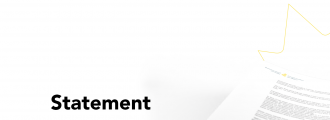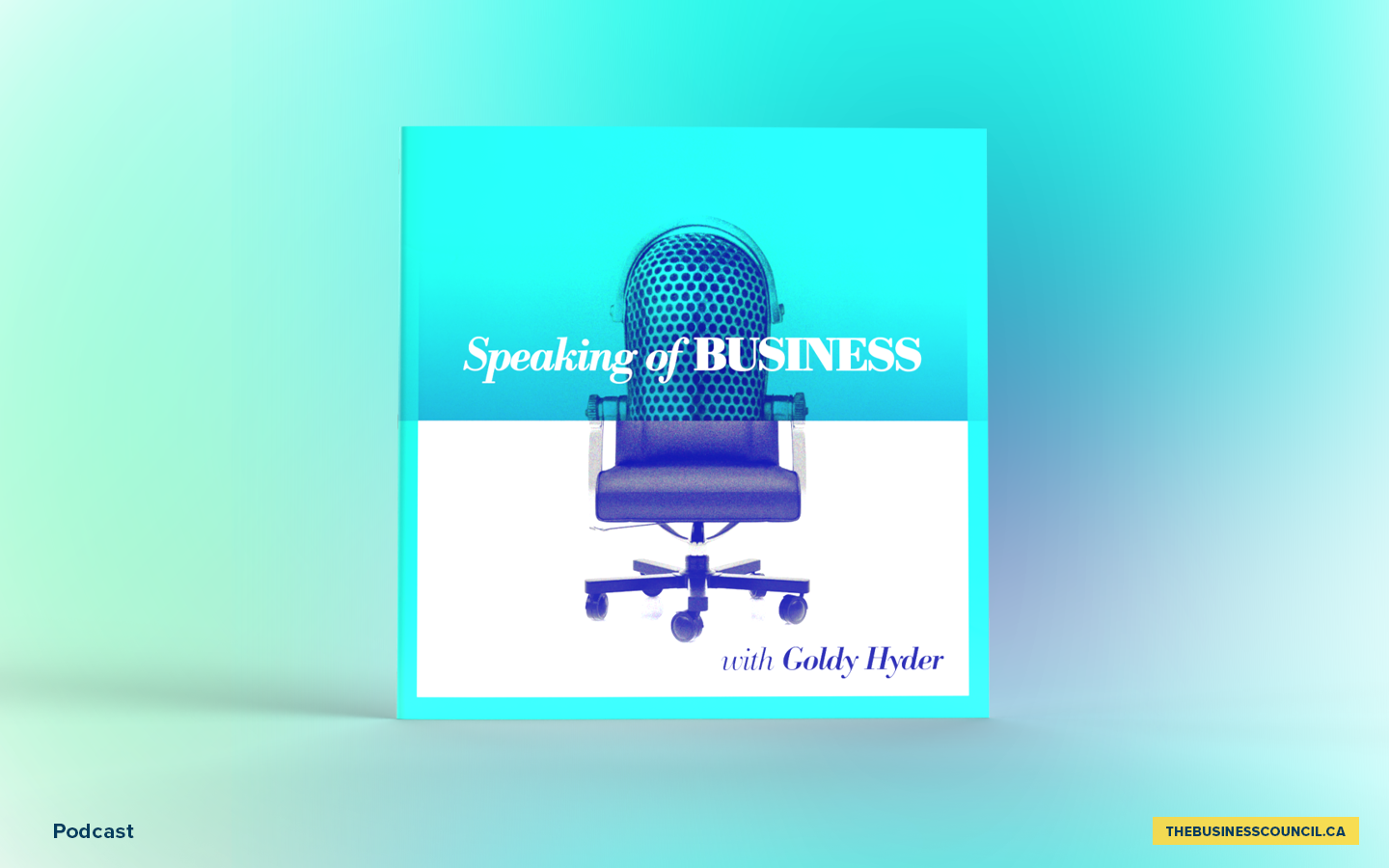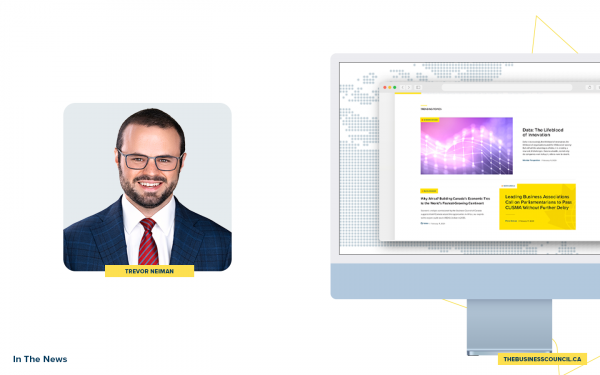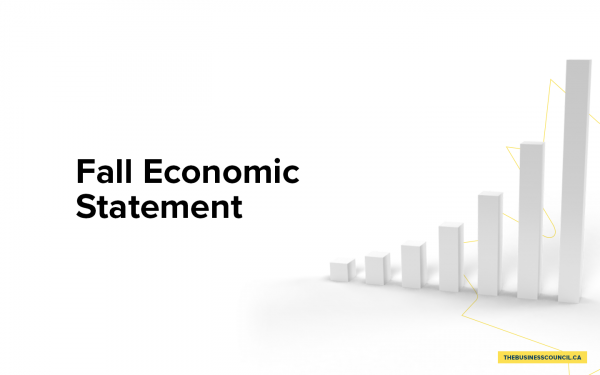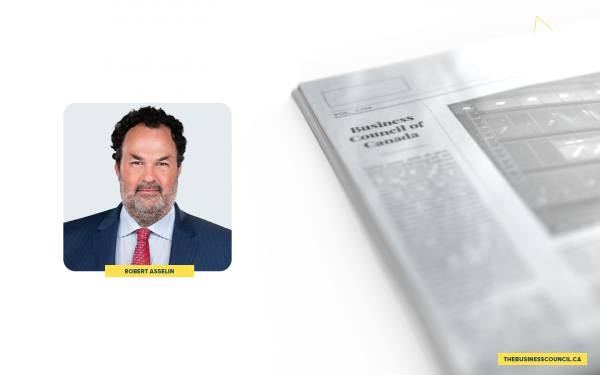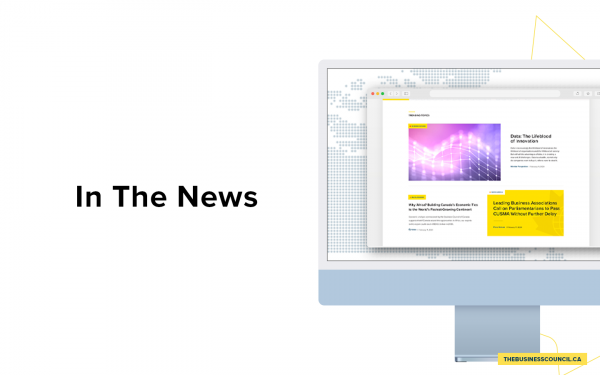There’s no textbook on how to manage under COVID-19
In light of the COVID-19 emergency, we’ve temporarily suspended our regularly scheduled series of conversations with Canadian CEOs. But we’re not going away. Instead, we’re going to pivot to the health emergency itself. We’re going to explore the impact on companies and workers across the country. And we’re going to find out how business leaders are responding to crisis.
“There’s no textbook on how to manage under COVID-19.” Nicolas Marcoux, CEO of PwC Canada, shares his thoughts on Canada’s future business landscape, adapting to the challenges of the pandemic, and why cyber attacks are becoming more of a threat to businesses.
Latest Podcasts
Transcript
Goldy Hyder:
I’m Goldy Hyder of the Business Council of Canada. Welcome to Speaking of Business. The COVID-19 pandemic has in many ways put our lives on pause, but in other ways, the pace of change is accelerating as we learn how to co-exist with COVID. In March, within a matter of days, businesses across Canada figured out how to adapt. Here we are, months later, we continue to innovate and plan for what comes next. With all of this change, what does Canada’s future business landscape look like? Nicolas Marcoux is the CEO of PwC Canada. With offices across the country, PwC offers a broad range of professional services to clients to help them solve problems and identify opportunities. Adapting to change is at the forefront of what they do. Welcome to the podcast, Nic, great to have you here.
Nicolas Marcoux:
Thank you for having me Goldy.
Goldy Hyder:
Well, look, as I said in the introduction, you’re sort of in the mix of things, right? You’re in the thick of it. It’s not like you’re at the hospitals but you’re certainly seeing the surgeries that are taking place inside businesses these days, in terms of how to manage this. How do you think this pandemic is going to affect the way businesses operate in the future?
Nicolas Marcoux:
Great question. I think first of all, at PwC, we were on a digital transformation journey that had started well before COVID. I’m very happy that we had started well before COVID because we went from having 15 per cent of our people working from remote to 97 per cent overnight. Every CEO I’ve been speaking to across the country has really made the statement that they need to transform their business and go on the digital transformation journey even faster.
Nicolas Marcoux:
In our case at PwC, we have decided to double down on our digital transformation and to accelerate this transformation. A big piece of this is up-skilling our people, giving them the capabilities they need to thrive in a digital environment. Working from remote, I think is going to be something that is going to stick. I don’t think at PwC, we will be going back to 15 per cent of our people working from remote. I think it’s going to be … It’s not going to be 97 per cent the way it is today, but it will be some higher number, maybe like 35 or 40 per cent of our people who may never come back to the office.
Goldy Hyder:
What about the jobs? What sectors do you think are going to expand and contract? Because we’re seeing a lot of what you said, but this crisis is a disruptive force, but it’s accelerating things, but it’s also creating some gaps in the supply chains. What are you seeing on that front?
Nicolas Marcoux:
Obviously, we can expect that e-commerce has definitely benefited from this pandemic and it will probably continue to benefit from it. Obviously the food retailers are doing well, pharmacy, the video communications company, everything that’s around the cloud and last mile delivery. They’re all performing extremely well. We have a lot of clients in travel and entertainment and high-end luxury retail and restaurant. It’s been devastating for these sectors, with the last two months, of how it’s impacted their businesses.
Nicolas Marcoux:
Now our governments are trying to do things with subsidies. If I think of the airline industry, that’s probably the one that’s been hit the hardest. Now, I guess we can question, as a society, are we doing enough? I think the long-term effects as companies go more digital, I think it’ll be a better customer experience and good for everybody.
Goldy Hyder:
Now one of the things that you and I talked about a few weeks ago was a trend that you’re seeing in terms of cyber attacks in North America. Talk to our listeners about that.
Nicolas Marcoux:
So as we are all working from remote, or many of us, the risk profile changes. It’s very different when we’re working remote than when we’re all working from the different corporate head offices and we’re actually playing on the hackers home field, they’re used to working from remote, that’s their core business. We monitor cyber attacks across North America. We’ve seen a huge uplift in activity. I would say almost like 20-fold from what it was pre-COVID. Some of it is not very sophisticated. Some of it is actually quite sophisticated, which is quite scary. So a lot of the CEOs I’m talking to are actually quite concerned about cyber security and how they protect their data and their clients’ data. So it’s something that we’re definitely working very closely with many of our big clients to protect them.
Goldy Hyder:
Yeah. I love the home field of hackers land. I guess those mischievous dudes, or are often dudes, I think, are always working from home, aren’t they?
Nicolas Marcoux:
Correct.
Goldy Hyder:
Well, look, the other thing about PwC is that you’re a very strong global brand and I’m sure you’re interacting with your colleagues around the world. What are you learning from them as particularly those in markets that have come before us? I know you’re in China and Italy and Spain and Japan, for example. What are the things that you’re learning from them that you think would help Canada and Canadians adjust to life with COVID?
Nicolas Marcoux:
So in the first few weeks of the COVID-19 crisis, I did reach out to my counterparts in China and Italy, who were a few weeks ahead of us, because I couldn’t find the textbook as to how to manage under COVID-19. It was not available in any of the stores. I thought the best leading indicator was actually territories that were three or four weeks ahead of us. Now the first lesson that I got from them was communicate, communicate, communicate. There was a lot of uncertainty and we at PwC, we certainly took that direction of communicating a lot with our employees, with our partners, with our clients, our retired partners. So all of our stakeholders.
Nicolas Marcoux:
Then another great comment or piece of advice I got from our Japanese CEO was, he said, “You will see after three, four weeks, you’re kind of thinking everything is fine working from remote. People are actually quite productive and you’ll be pleasantly surprised,” as I was, how business was resilient and how we were being able to deliver for our clients. But he did tell me that, “After four or five, six weeks of working from remote, you will see a drop in productivity, a drop in morale and an increase in mental health issues.” So with that in mind, we had all- people webinar, I think it was after week five and had a psychologist on the line to give us tips on how we can work from remote, stay healthy from a mental health perspective and be there for each other. So that was definitely a good lesson learned from both a communications and mental health perspective.
Goldy Hyder:
Yeah, that’s certainly a common theme in a lot of our conversations. What else is PwC doing for the community through this crisis?
Nicolas Marcoux:
Part of our value is making a difference. We have five core values and one of them is making a difference. So making a difference for our people, making a difference for our clients and making a difference for the communities where we live in. We were approached by CPA Ontario to participate in an industry-wide initiative to provide free tax returns for the people who are working on the front lines and their families.
Nicolas Marcoux:
So if you think of nurses and orderlies and so we committed to preparing a thousand tax returns free of charge to help with those people, so to remove a portion of the stress that they have. So, obviously, we don’t have the capabilities to be on the front lines and to be in the hospitals, but we can do tax returns. Hopefully that removes a portion of the stress that those people have on the front lines and I thought it was a great initiative from CPA Ontario and we actually did it using a lot of digital and our digital experience to try to be as efficient as possible. I think that was greatly appreciated.
Nicolas Marcoux:
We also, second thing we did, in giving back, we have a global initiative called New World, New Skills and it’s all about the digital transformation. We have a digital fitness app that we had internally to help our people upscale and learn new things on their digital journey. We decided to make it available for free to all our clients worldwide. I’m happy to report that outside of the US, Canada had the most uptick on our digital fitness app. So those are two things that we did to help society and a lot of the non-profit organizations actually took us up on this, the digital journey, to upscale themselves so that they can do a better job and be more efficient.
Goldy Hyder:
Oh, that’s great. Now I know that you’ve been pretty lucky in terms of, I think you’ve got, what, about 8,800 staff? So have you had to deal with the virus and how have you managed that situation?
Nicolas Marcoux:
Well, you’re right. We have 8,800 people across Canada and I remember the decision to close the offices, the decision we took mid-March, I think it was March 15th to be exact. We ended up starting all of the 24 offices across the country on March 17th. To be perfectly honest, I was torn. It’s easy with the benefit of hindsight that it was the right thing to do and you want to protect your people, but you’re also, are you contributing to a panicked effect that will throw the Canadian economy in a tailspin?
Nicolas Marcoux:
So when I heard that our people were afraid to come into the office, well, for me, that was the compelling argument. We’re not in the business of fear at PwC and our people come first and we didn’t want to put them in harms way. It was a very easy decision to shut down all of the offices on March 17th. It will be a much more complicated decision, how we re-open the offices, which ones and at which cadence and how many people. There’s a lot of logistics that will go into that.
Goldy Hyder:
Yeah. I mean, in some ways we’re just getting started, aren’t we?
Nicolas Marcoux:
That’s right. It’s going to be awhile.
Goldy Hyder:
Well, that of course allows me to conclude our podcast with a pretty standard question we like to ask our leaders, which is, how has this crisis impacted you as a leader? What are you learning about yourself through this process?
Nicolas Marcoux:
Well, fantastic question. So I would say, and again, I’ll go back to the comment that there no textbook on how to manage under COVID-19. I have found the Canada business leaders very accessible, very open to sharing as to what each of us are doing. Personally, I quickly created two cells. I split the leadership team into two units, one dealing with crisis management and the other one dealing with what I would call business as usual.
Nicolas Marcoux:
About four weeks into the crisis, we started thinking about our return to office and created a third cell led by our chief innovation officer and our real estate people and a whole bunch of young, smart, creative people thinking, what does PwC looked like when we come back, both pre-vaccine and post-vaccines? Sharing that idea with other CEOs across the country. They were saying, “That’s great. Let’s get your unit talking to our unit.” So I saw a lot of willingness to share and help each other out across the country, which speaks volumes to our culture and values in Canada.
Nicolas Marcoux:
From a personal wellness, I would say Goldy, I used to travel maybe 12 hours a week. So now I’m running, instead of running two to three times a week, I’m running four to five times a week. I’m eating better and I’m running more. So I’m down eight pounds. So I’m going to come out of this COVID-19 situation a lean, mean fighting machine.
Goldy Hyder:
What a great spot to end at. Nic, thanks for doing this, and stay fit my friend.
Nicolas Marcoux:
Thank you very much for having me.
Goldy Hyder:
Nicolas Marcoux is the CEO of PwC Canada. We’ve heard a wide range of voices and perspectives on this podcast, but I encourage you to listen to more of our conversations at SpeakingOfBiz.ca, that’s biz with a zed or wherever you get your podcasts. Until next time I’m Goldy Hyder, thanks for joining us. Be well.
